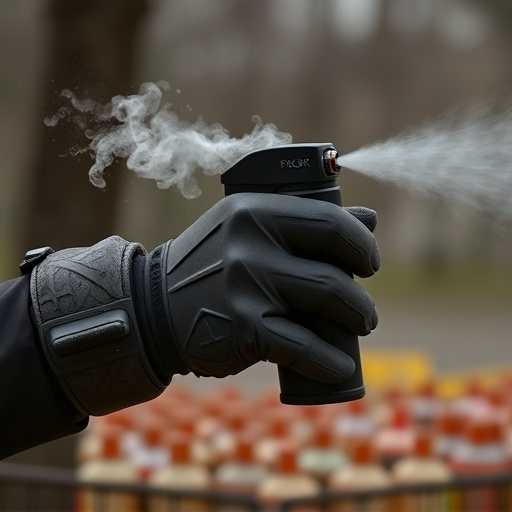Pepper spray exposure requires immediate decontamination to prevent skin irritation. Rinse eyes with water for 15 minutes, wash exposed skin with soap and water, and use a cold compress daily. Store sprays safely, away from heat and sunlight, and check expiration dates regularly. Research local laws before purchasing, as regulations vary; consult professionals for post-use decontamination advice.
“Self-defense inflammatory spray devices, like pepper spray, offer individuals powerful tools for personal safety. However, understanding their immediate impact on skin is crucial for effective decontamination. This article explores the science behind pepper spray’s effects and provides practical guidance on decontaminating skin from exposure. We delve into advanced cleaning methods, safety precautions, storage best practices, and legal considerations surrounding these devices. By equipping yourself with this knowledge, you’ll be prepared to handle unexpected situations while ensuring your well-being.”
- Understanding Pepper Spray's Immediate Impact
- The Role of Skin Decontamination Techniques
- Effective Cleaning Methods After Exposure
- Safety Precautions and Storage Guidelines
- Legal Considerations: Use and Possession Rules
Understanding Pepper Spray's Immediate Impact
When a self-defense inflammatory spray device, like pepper spray, is deployed, it immediately releases a caustic chemical that irritates the eyes and respiratory system. This sudden exposure can cause temporary blindness, coughing fits, and difficulty breathing, providing the user with crucial time to escape or deescalate the situation. The immediate impact of pepper spray is designed to incapacitate an attacker, giving the victim a chance to decontaminate their skin and seek safety.
After the initial discharge, it’s essential to understand that pepper spray residue can remain on the skin, clothing, and other surfaces. Decontaminating the affected areas as quickly as possible is vital to minimize discomfort and potential long-term health effects. Proper decontamination techniques include rinsing eyes with clean water for at least 15 minutes and thoroughly washing any exposed skin with soap and water.
The Role of Skin Decontamination Techniques
After coming into contact with pepper spray, the first step in self-defense is to quickly decontaminate the skin to minimize its effects. Skilled practitioners use specialized techniques to safely remove any residual spray from the body. This process involves gentle yet thorough washing with clean water and neutralizing agents to prevent irritation and discomfort.
Effective skin decontamination from pepper spray requires a strategic approach. It’s crucial to wash affected areas away from eyes, nose, and mouth to avoid further inhalation or ingress of the irritant. By following these steps, individuals can mitigate the impact of pepper spray exposure, ensuring their safety and well-being during emergencies.
Effective Cleaning Methods After Exposure
After exposure to a self-defense inflammatory spray device, such as pepper spray, proper decontamination is crucial to prevent long-term skin irritation and discomfort. The first step is to immediately rinse the affected area with plenty of clean water for at least 15 minutes. This helps to dilute and wash away any remaining spray residue.
To further decontaminate the skin, consider using mild soap and warm water. Gently cleaning the area can help remove any stubborn pepper spray particles. Additionally, applying a cold compress or ice pack wrapped in a towel for 10-15 minutes several times a day can alleviate inflammation and reduce pain. Remember to avoid rubbing the affected skin, as it may worsen irritation.
Safety Precautions and Storage Guidelines
After using a self-defense inflammatory spray device, proper safety precautions and storage guidelines are crucial to ensure effectiveness and prevent accidental misuse. If pepper spray comes into contact with your skin or eyes, immediately decontaminate the affected area with plenty of water for at least 15 minutes. This step is vital to neutralizing any residual chemicals and minimizing potential irritation or damage.
Store self-defense sprays in a cool, dry place away from direct sunlight and heat sources. Keep them out of reach of children and unauthorized individuals. Ensure the container remains sealed to prevent contamination and maintain optimal performance. Regularly check the expiration date and replace the spray as needed to guarantee its potency when you need it most.
Legal Considerations: Use and Possession Rules
Before considering a self-defense inflammatory spray device, it’s crucial to understand the legal considerations surrounding its use and possession. Laws vary widely from region to region, so thorough research is essential. In many jurisdictions, pepper spray—a common active ingredient in these devices—is classified as a weapon, subject to strict regulations. Some areas allow its use for self-defense only, with specific restrictions on where and how it can be carried.
Possessing or using inflammatory spray without a permit or in an inappropriate manner can lead to severe legal consequences, including fines and imprisonment. It’s also important to understand that decontaminating skin from pepper spray—a critical step after use—may require specialized knowledge and products. Always consult local law enforcement or legal professionals for the most up-to-date information on regulations related to self-defense inflammatory spray devices.
In conclusion, understanding how to effectively decontaminate skin from pepper spray is crucial for both self-defense enthusiasts and law enforcement officers. By mastering immediate impact mitigation techniques, proper cleaning methods post-exposure, and adhering to safety precautions, individuals can ensure their well-being following potential exposure. Additionally, being aware of legal considerations surrounding the use and possession of pepper spray devices empowers responsible usage. Remember, knowledge is key in navigating this powerful tool’s capabilities and limitations, ultimately fostering safety and peace of mind.
